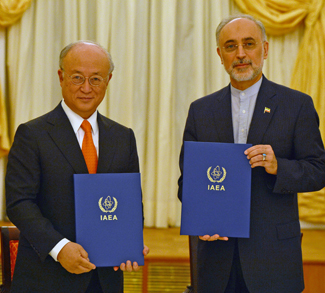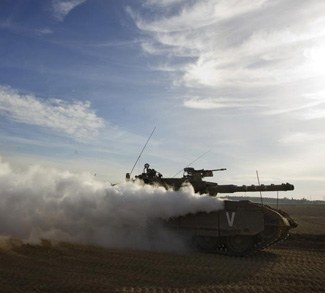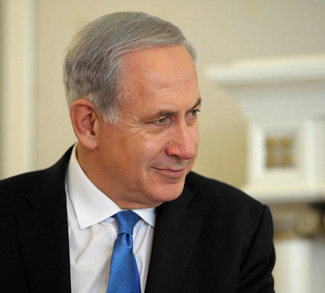The photos of the protagonists in the agreement reached between the Iranian Foreign Minister Zarif and the representatives of the United States, Russia, China, France and Britain, the EU, plus Germany evoke those of Soviet Premier Mikhail Gorbachev and President Ronald Reagan after their historic meeting in Reykjavik in 1986 to reduce nuclear armaments. Both occasions confronted nuclear proliferation, and both produced much more than anyone could have imagined. Gorbachev launched glasnost and then perestroika to save communism and adapt to the realities of his time, only to witness the collapse of the Berlin Wall just four years later. The ayatollahs of Iran have pursued nuclear research to bring the great powers to the table in order to shed the weight of international sanctions while preserving their unique theocracy. Iran’s atomic weapons program, if it ever truly had one, has been shelved and the Islamic Republic will no longer be a pariah among nations. There are no guarantees as to how Iran will use its restored prestige on the international stage, but much like Obama, President Rouhani has also taken a big risk. The lifting of sanctions implies an opening to the world. The genie of hope for Iran’s many young people – 60% of the population is under 30 years old – has been let loose and it will be impossible to repress their aspiration for more freedoms, personal and political. Yet there are no guarantees that the ayatollahs and mullahs will be relinquishing power to a more secular group of leaders in the near future.
For now, the agreement is being promoted as imposing tough controls on Iran’s pursuit of nuclear weapons as well as the acquisition of other weapons and the technology to build the ballistic missiles needed to deploy them. But, Iran has now resumed the role of great regional power and an important international player, a role it lost in the wake of the 1979 Revolution. Indeed, the agreement with Iran, far away from the atomic ambitions, represents an opportunity to change the strategic balance in the whole Middle East. This means there are better chances now to stop the conflict between Sunnis and Shiites, neutralize Islamic State, and perhaps even revive the peace negotiations between Israelis and Palestinians, Prime Minister Netanyahu notwithstanding. What was Barack Obama’s challenge with the ayatollahs could eventually provide more security for all, starting with Israel and Saudi Arabia, the very same that have criticized the agreement the most. Washington understands very well that the agreement, from a strictly military point of view, in no way stops Tehran from interfering, or engaging, in the Middle East, helping Assad in Syria, Hezbollah in Lebanon, or financing groups in Yemen or Bahrain to advance their common cause as Shiites.
The restrictions on nuclear ambitions will last ten years while leaving open the possibility that the Islamic Republic could accumulate material and knowledge. But, in ten years a new generation of ayatollahs, with the unclear role of the influential Revolutionary Guards, may have different views. In fact, the real hope lies less in their decision to cancel their nuclear military program outright than in the reawakening of Iranian civil society, such that it might prevail in leading the charge toward change, choosing to steer Iran to play a responsible role in the international arena. If that happens, Iran and Saudi Arabia will talk, potentially quelling the conflict between Shiites and Sunnis, stifling Islamic State and various other extremists, bringing stability to Iraq and Syria, and perhaps resolving the differences that have eroded American relations with Saudi Arabia, Egypt, and Turkey.
The agreement is risky and complicated and it could yield historical results far more significant than the nuclear deal with Iran. This explains the fierce reactions in the US political arena, not only from congressional leaders like Speaker of the House Republican Boehner, but also from the presidential candidates for 2016. One such example is GOP Sen. Lindsey Graham, who described the deal rather sensationally as “a declaration of war and a death sentence for Israel.” Indeed, the US administration should invest the strategic capital deriving from the Iran deal in relaunching Israeli-Palestinian negotiations. President Obama has nothing to lose and much to gain; he can threaten to cut off aid, if necessary, considering the friction with Netanyahu, but Obama still has a year and a half in office and wants to continue to make history and he is not at all obliged to follow the dictates of the Lobby in Washington. The peace plan should be comprehensive and resume talks where they left off in the period preceding the round of civil wars in the Middle East and North Africa, euphemistically known as the Arab Spring, including the Golan, even if Syria is in a disastrous situation for now. This is important because it would affect Lebanon and help reduce Hezbollah’s fanaticism, such that it can begin to dismantle its military component.
A new balance of power in the Middle East
Certainly, in the short term, the Vienna Agreement upsets the balance of power in the Middle East, enhancing the strategic rivalry between the ayatollahs and the Shiite Sunni-Israeli front. Iranians will be happy with investments from Europe and emerging powers, including China, but Iran’s allies have made a more strategic calculus. Syrian President Bashar Assad was the first to rejoice, providing a “greater commitment to Tehran for good causes,” or more resources for his regime as well as its other regional allies like the Lebanese Hezbollah, Iraq’s government, Shiite militias in Iraq and Syria, Houthi rebels in Yemen, and the opposition in Bahrain. On the skeptical side, King Abdullah of Jordan who defines the geopolitical arc from Iran to Lebanon under the influence of the ayatollahs as the Shi’ite crescent, fears that the release of economic resources adds to Tehran’s legitimacy, leaving it as the regional giant that can now use every crisis situation to pursue its political and military objectives.
In Yemen, the reaction to Iran’s new perceived hegemony was prompt. Forces loyal to former president Mansour Hadi, supported by the Saudis, launched a massive bombing raid targeting Houthis in Aden, adding that they will do “everything” to control the city overlooking the Strait of Bab el-Mandeb, which gives access to the Suez. In Bahrain, the agreement has been interpreted as a carte blanche for Iran to develop the atomic bomb – according to the foreign affairs minister Sheikh Khaled al-Khalifa – which will undoubtedly lead to a nuclear race. It’s not just a question of Saudi Arabia; other nations in the region will also want to have this capacity. Bahrain has a Sunni population that feels more exposed to the risks of a stronger Iran because of domestic opposition, branded as Shiite, which has challenged the monarchy in its own manifestation of the ‘Arab Spring’ since 2011.
Sunni fears and concerns, unfounded or not, have fueled the possibility of a strange convergence of interests between Saudi Arabia and other Gulf countries and Israel, as rumors abound of meetings between Netanyahu’s director general of the Foreign Ministry, Dore Gold, with counterparts from Gulf countries. Meanwhile in Turkey, Recep Tayyip Erdogan was more diplomatic, praising the Vienna Agreement as contributing to stability while also urging Iran to rethink its policies in Syria and Yemen. Erdogan has avoided taking clear sides between Tehran and Riyadh, but if Iran raises its ‘profile,’ Erdogan, should his party remain in power, might feel compelled to embrace the Saudis’ position in the regional balance.
The deal’s repercussions go beyond the Middle East. Russia and the United States have witnessed a significant thaw as a result of the Vienna agreement. President Obama said “The 5 + 1 has held up,” praising Russia’s effort and ability to maintain open negotiations and a willingness to reach a positive outcome notwithstanding the evident mutual respect and friendly demeanor of US Secretary of State John Kerry and his Russian counterpart Sergei Lavrov. Putin and Obama have spoken several times on the phone and as the chats focused on Iran, the bitterness and misunderstanding over Ukraine was relegated to the background. “Russia has been helpful,” Obama said, speaking to the New York Times of the role of Moscow at the negotiating table. “I have to be honest, I was not sure given the differences on Ukraine,” said Obama adding that he was surprised by Putin: “We would not have reached this agreement were it not for the desire of Russia to stay with us and with other partners in the 5 + 1 insisting for a solid agreement.” Through the softening of relations with Russia, with Iran, Obama has shown that he has pursued the path of diplomacy and that this is the only possible path.
As for regional diplomacy, the Vienna Agreement has redrawn the map, dividing it into four camps: Iran, Saudi Arabia, Turkey, and Israel. Egypt is among the great states, but it is still crippled by an incipient civil war, fueled by the fierce repression of the Muslim Brotherhood and the increasingly aggressive onset of groups inspired by Islamic State, which are expanding in the Sinai and which General al-Sisi’s government is struggling to contain. Saudi Arabia is the head of the Sunni camp with the politically and financially stronger Iran at the opposite end. Turkey remains between them. A new regional balance will be the end goal and in the meantime a modus vivendi will have to be reached to ensure the most peaceful possible ‘crisis management.’ In Iraq, Iran might help to quell Saudi and Turkish fears by opening up to Kurdish and Sunni tribes, overcoming the unfortunate sectarian exclusivism of the former prime minister al-Maliki, whose sectarianism helped ISIS spread. His more moderate but still Shiite successor, Haider al-Abadi, has yet to overcome the divisions left by al-Maliki.
Syria will be the main stage, where it is clear that Islamic State’s terror, which has served as the Sunni bloc’s diamond tip in countering Shiite expansionism, cannot be contained and stopped without a broad agreement, especially with forces linked to the Assad regime. In turn, the more moderate rebel forces linked to the Muslim Brotherhood, Saudi Arabia, Iran, Russia, as well as other Arab and the Western powers and the United States itself will have to come to an agreement. The current military campaign has proven entirely ineffective and only comprehensive diplomacy can achieve progress. Turkey, which is concerned about the potential for Kurdish independence and which has economic and financial ties to Iran, despite their different positions vis-à-vis Syria and Erdogan’s goal to bring about Assad’s fall, could be one of the main winners of the Iranian agreement. Indeed, it is free to invest and benefit from the construction of pipelines in various other infrastructure, of which Iran has considerable need.
Israel is the one that comes out worst. Netanyahu has resisted Obama’s negotiations, affronting him with his speech to the US Congress in March, cutting him off from any possibility to influence the content and progress of the negotiations. Now he has ‘rejoined’ the process by urging the US Congress to reject the agreement. This too could backfire. Such heavy intervention, even exploiting a Republican majority, risks building a coalition around Obama by Democrats who are sitting on the fence over the Vienna Agreement. Obama has already warned he would veto any Congressional decision opposing the agreement.
It follows that Iran has now become a primary partner for the United States. This does not mean there will be close cooperation; but on some fronts there may be collaboration, as in the battle against ISIS. But it is likely that the territory for cooperation will become wider.
The opinions, beliefs, and viewpoints expressed by the authors are theirs alone and don’t reflect any official position of Geopoliticalmonitor.com.




